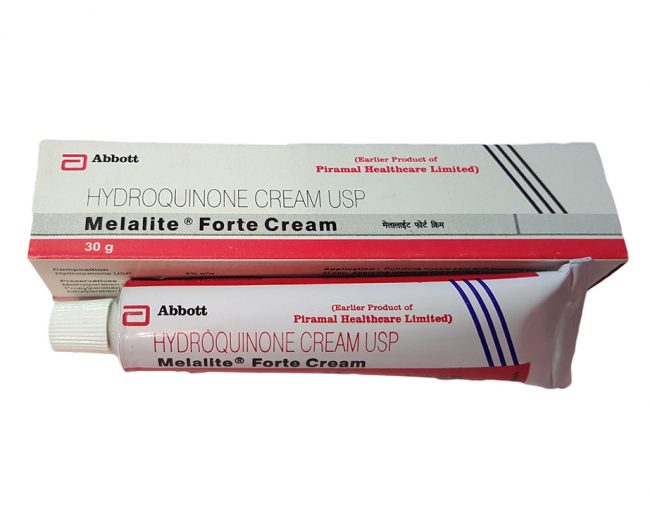Hydroquinone is a common ingredient found in many skin-lightening products. It is used to treat hyperpigmentation, such as age spots, acne scars, and melasma. However, there has been some controversy surrounding the safety of hydroquinone. In this article, we will explore whether hydroquinone is safe for skin lightening.
What is Hydroquinone?
Hydroquinone is a chemical compound that is commonly used in skin-lightening products due to its ability to inhibit melanin production. Melanin is the pigment responsible for giving color to our skin, hair, and eyes. When the body produces too much melanin in certain areas, it can lead to hyperpigmentation. Hydroquinone works by blocking the enzyme responsible for producing melanin, which reduces the appearance of dark spots and other forms of hyperpigmentation.
Hydroquinone Similar Products
Here are some Similar Products that contain Hydroquinone
1. Melalite Forte
Melalite Forte is a topical skin cream that contains the active ingredient hydroquinone, which is used to decrease the production of melanin in the skin. It is often prescribed for conditions such as melasma, hyperpigmentation, and other skin discolorations. Buy Melalite Forte from Livyaush website at affordable price.
2. Brite Cream
Hydroquinone, a skin-lightening chemical, is a component of Brite cream. Tyrosinase, a crucial enzyme in the production of the melanin pigments, is used to block it. Skin's ability to lighten is attributed to the pigment melanin. Applying this ointment to the affected region once or twice a day, or as directed by your dermatologist, is advised if you have skin issues.
3. Eukroma Cream
Eukroma cream 4% contains 4% hydroquinone, as is abundantly obvious from the name. By fading freckles, age spots, melasma, and hyperpigmentation, it is an excellent treatment for treating skin conditions. Due to hormone changes, ageing, and sun exposure, the body develops all of these skin problems.
Is Hydroquinone Safe?
The safety of hydroquinone has been the subject of much debate over the years. While studies have shown it to be effective at reducing hyperpigmentation, there are concerns about its potential side effects. Some studies have linked hydroquinone to skin irritation, inflammation, and even cancer.
In 2006, the US Food and Drug Administration (FDA) proposed a ban on over-the-counter hydroquinone products due to concerns about its safety. However, the ban was never implemented, and hydroquinone continues to be used in many skin-lightening products today.
It is important to note that the use of hydroquinone is regulated in many countries, including the United States, where it is only available with a prescription. This is because high concentrations of hydroquinone can cause skin damage and potentially increase the risk of skin cancer.
Alternatives to Hydroquinone
If you are concerned about the safety of hydroquinone or have experienced adverse reactions to it in the past, there are alternative options available for treating hyperpigmentation. Some natural alternatives include:
1. Vitamin C
Vitamin C is a powerful antioxidant that can help to brighten the skin and reduce the appearance of dark spots. It works by inhibiting the production of melanin and stimulating collagen production, which can improve the overall texture and appearance of the skin.
2. Kojic Acid
Kojic acid is a natural compound derived from mushrooms that has been found to be effective at reducing hyperpigmentation. It works by inhibiting the production of tyrosinase, an enzyme responsible for producing melanin.
3. Licorice Extract
Licorice extract contains a compound called glabridin, which has been found to have skin-lightening properties. It works by inhibiting the production of melanin and reducing inflammation in the skin.
Conclusion
Hydroquinone is a common ingredient found in many skin-lightening products, but its safety has been the subject of much debate. While studies have shown it to be effective at reducing hyperpigmentation, there are concerns about its potential side effects. If you are concerned about the safety of hydroquinone or have experienced adverse reactions to it in the past, there are alternative options available for treating hyperpigmentation. It is important to consult with a dermatologist to determine the best course of treatment for your individual needs.





Comments